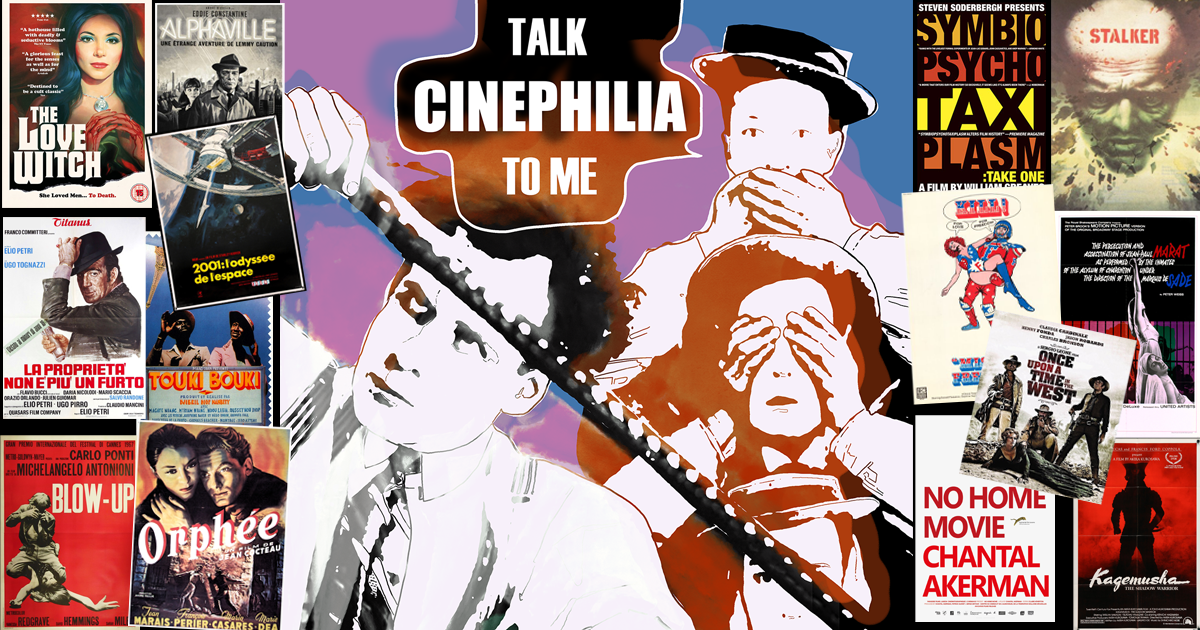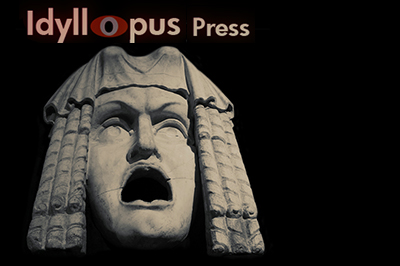
Show Description
Talk Cinephilia to Me is a podcast about watching cinema--auteur, outsider, experimental and B movies--brought to you by author playwright, Juli Kearns, and her son, Aaron Dylan Kearns, an experimental filmmaker who, though he was raised on great cinema, loves tawdry horror. He knows things I don't about film. I know things he doesn't. Most importantly, we know enough to be very aware of what we don't know. We promise to be humble, somewhat meandering hosts because we're disaffected dyslexic leftists with opinions and our filters are busted.
Follow Talk Cinephilia to Me on Facebook, Twitter, and Instagram. The best experience will be on Facebook for show notes and information. The lousiest experience is on Instagram, which I may have to abandon as it's just not good for updates and notes. Twitter, with its character limit, also strains ability to give a reasonably informative update but at least updates on podcasts are more likely to reach a follower.
We are also available on the following platforms:
Anchor
Spotify
Google Podcasts
Breaker
Pocket Casts
Overcast
Radio Public
Episodes
Ep. 9 - 2020 May 21 - Marathon Episode on the Soviet Necrorealist Films of Evgeny Yufit and Vladamir Maslov
Aaron has long been an appreciator of the Soviet Necrorealist films of Evgeny Yufit, who later teamed up with Vladamir Maslov. For those who are unfamiliar with the genre, we discuss its frenetic history, pondering the myth versus reality of artistic spontaneity, dissect Yufit's early work for themes that will be elaborated upon in his features, and compare and contrast Yufit's early films with those he later co-directed and co-wrote with Maslov. The movies covered in this episode are: "Werewolf Orderlies", "Woodcutter", "Spring", "Suicide Monsters", "Fortitude", "Knights of Heaven", "Daddy, Father Frost is Dead", "The Will", "The Wooden Room", and "Silverheads". If we took 2 hours it's because these dreamlike, absurd films, both grotesque and comic, confrontational, aesthetically remarkable in every respect, eventually even startlingly beautiful, demand deep consideration.
Visit Facebook for supplemental content.
Catch us on iTunes.
Ep. 8 - 2020 May 14 - Alla Mazimova's 1922 "Salome" and Ken Russell's 1988 "Salome's Last Dance"
We discuss Nazimova's "Salome", astonishing even today, with design by Natacha Rambova influenced by Aubrey Beardsley's illustrations of Oscar Wilde's play, then consider the possible influence of the silent film on Ken Russell's representation of Salome. Along the way we also discuss Russell's "The Debussy Film", how his choice of music for "Salome's Last Dance" refers back to "The Debussy Film", and why he might have chosen "In the Hall of the Mountain King" from "Peer Gynt" for Salome's dance music. Though I mention that Nazimova was famed for her performances in Ibsen plays, i got a little too carried away with talking about Peer Gynt and trolls and neglected, during the podcast, to remind how Grieg's "Peer Gynt" had been inspired by Ibsen's play. While Nazimova concentrates on interpreting Wilde, Russell films (and photographs) Wilde observing a production of his play, so that we must consider Oscar Wilde's relationship to it--and his trial and imprisonment. One could spend days discussing these films and still not do them justice, and i really looked forward to doing the podcast on them. Then we got silly, and though we dug we didn't go as deep as I would have liked. Hopefully, we still inspire the listener to seek out these two films and view them.
Visit Facebook for supplemental content.
Catch us on iTunes.
Ep. 7 - 2020 May 7 - "The Texas Chainsaw Massacre" in context of Tobe Hooper's "The Heisters", "Down Friday Street", and "Eggshells"
We discuss Tobe Hooper's "The Texas Chainsaw Massacre", then look at Hooper's earlier films, "The Heister", "Down Friday Street", and "Eggshells", and examine again "The Texas Chainsaw Massacre" in light of them. There are some caveats in this episode concerning my hazarding an interpretation of "Eggshells", which I did in the moment in respect of obvious conflict concerning the 1960s counter-culture giving into what might be considered middle class values. Though the movie does comment on such, it is not cut and dry, and complexity is layered with fractured, incomplete truths. I may take a couple of weeks more to think about how "The Texas Chainsaw Massacre" works in relation to "Eggshells" and write something up on it, and I don't know if it will be the view I expressed in the episode.
A thing we explore in these episodes is how time, place, and personal history color the experience of a film. Personal history has meant that there have indeed been films I've been unable to watch or have put off watching for a number of years. In this episode I relate how Martin, my husband, had a work place accident, within our first year of marriage, which made it impossible for me to watch certain films for a while. He was working at a greenhouse and one of the large glass plates fell out of the roof, split as it hit his neck, and went both under and over his jugular vein so that the jugular was fully exposed but uncut while the rest of his neck had been sliced open. He had the trauma of his experience, but so did I and this meant that certain films that reminded me of the incident were left or avoided until I could tolerate them.
Visit Facebook for supplemental content.
Catch us on iTunes.
Ep. 6 - 2020 April 29 - Angels and Balloons - Albert Lamorisse's "The Red Balloon" and Ken Russell's "Amelia and the Angel"
We examine Lamorisse's "Red Balloon" in context of the rest of his filmography, then I cheer myself up with a discussion on "Amelia and the Angel", which was obviously influenced by "The Red Balloon" and has perhaps the cutest dog to ever appear in a film, except for your home movies.
Visit Facebook for supplemental content.
Catch us on iTunes.
Ep. 5 - 2020 April 22 - Five tales of Ben Hur! Exploring the Cinema as Spectacle
We discuss not only the 1925 and 1959 cinema extravaganzas of "Ben Hur", but also the book, the play, and the 1907 "Ben Hur", the first cinema edition that wasn't an epic but led to a costly battle over copyright. As it turned out, we loved the 1925 "Ben Hur", and we explore the reasons for this and how it differs from the 1959 remake.
Visit Facebook for supplemental content.
Catch us on iTunes.
Ep. 4 - 2020 April 15 - A Conversation with Romeo Carey, son of Actor/Director Timothy Carey, Part 2 of 2
If you haven't listened to part one of our two part conversation with Romeo Carey, now's the time to catch up, as today we've posted part two. Romeo Carey, indie director and educator, is the son of actor/director Timothy Carey who directed "The World's Greatest Sinner", and appeared in such films as Stanley Kubrick's "The Killing" and "Paths of Glory", as well as John Cassavetes' "Minnie and Moskowitz" and "The Killing of a Chinese Bookie". Many thanks to Romeo Carey for an insightful conversation! Producer/engineer credit: Martin Kearns
Ep. 3 - 2020 April 8 - A Conversation with Romeo Carey, son of Actor/Director Timothy Carey, Part 1 of 2
Today we are posting part one of a two part conversation with Romeo Carey, indie director, educator, and son of actor/director Timothy Carey. Timothy Carey directed "The World's Greatest Sinner", and appeared in such films as Stanley Kubrick's "The Killing" and "Paths of Glory", as well as John Cassavetes' "Minnie and Moskowitz" and "The Killing of a Chinese Bookie". Many thanks to Romeo Carey who was so generous with his time.
Ep. 2 - 2020 April 1 - The Dystopian Cinema of Arch Obeler, and Discussing the Cold War Zombie
Continuing a theme begun last week on Cold War era films with streets depopulated by killer radiation poisoning or a plague, the focus of this episode is Arch Obeler, not only his post nuclear apocalypse film "Five", but his fantasy-absurdist anti-fascism radio shows, his move into film, the anti-fascist movie "Strange Holiday", and his media-as-mind-control film "The Twonky". We also discuss "White Zombie" as another thread in the episode is how the zombie came to be used to represent authoritarian/fascist control of the population.
Ep. 1 - 2020 March 25 - Discussing the 1964 Film "The Last Man on Earth"
In this episode we discuss the 1964 Cold War style, post-apocalyptic film, "The Last Man on Earth", which features Vincent Price as the last survivor of a pandemic that turns people into vampires.
2020 March 22
Return to top of page
Link to the index page for all the analyses

